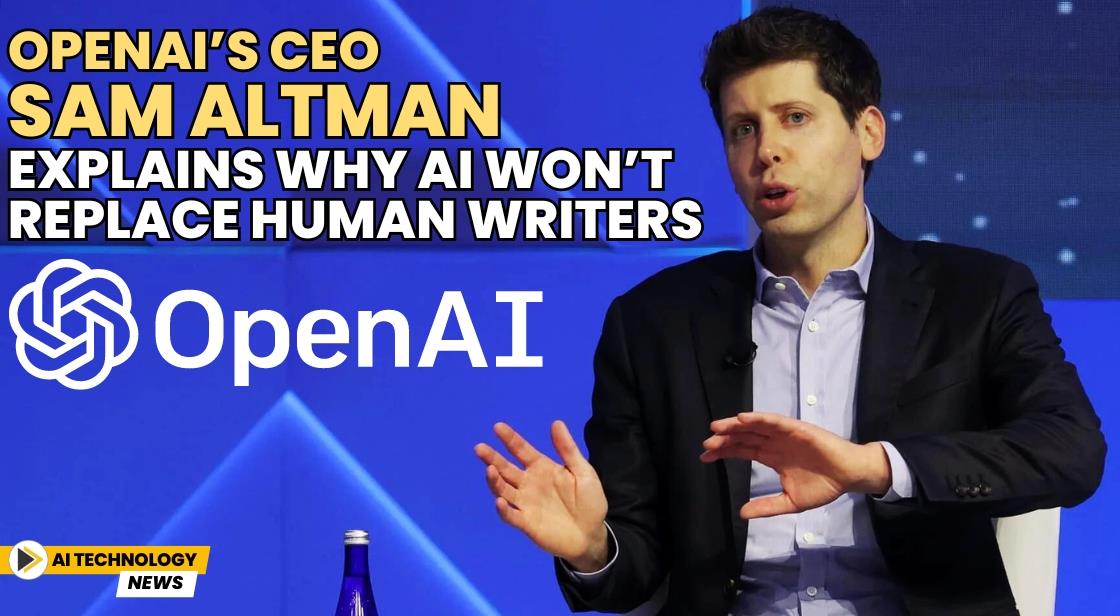OpenAI’s CEO Sam Altman Explains Why AI Won’t Replace Human Writers

News Synopsis
In an era where many jobs are believed to be at risk of being overtaken by Artificial Intelligence (AI), Sam Altman, the CEO of OpenAI, holds a different perspective when it comes to writers. Despite the growing influence of AI across various fields, Altman remains confident that human creativity and original ideas will continue to set writers apart from machines.
In a conversation with David Perell, a writer and podcaster, Sam Altman, the CEO of OpenAI, explained that AI is not poised to eliminate the need for human writers. "There's like a lot of bad AI writing plastered over the internet, and there's like a lot of like bad student assignments that have probably been written by AI," Altman remarked. "But I don't think anyone's serious," he added, referring to the assumption that AI will replace human authors anytime soon.
The Rise of AI in Writing
While AI-generated content is becoming more prevalent, particularly in student assignments, there is growing concern among professional writers about the technology's potential to displace jobs. For instance, some freelancers have reported losing contracts as their clients increasingly turn to AI for content creation. One freelance writer shared with Business Insider that he was let go when his client replaced him with AI-generated services.
However, not all writers are worried. Some have fully embraced AI as a collaborative tool. A prime example is the creation of AI-generated children's books, though these projects have faced backlash from artists and writers alike.
Tim Boucher, an author, went on to write over 120 books in just two years using chatbots like Claude and ChatGPT to generate both text and images. "My books allow AI models to speak for themselves, almost like the idea of an unreliable narrator in literature," Boucher told Business Insider.
Additionally, firms such as Scale AI and Surge AI are hiring professional writers to develop training content for their AI models, further highlighting the human-AI collaboration in content creation. These companies are seeking writers with advanced degrees and extensive experience to enhance AI’s writing capabilities.
Sam Altman on Human Creativity in Writing
Despite these advancements, Altman remains steadfast in his belief that AI cannot fully replace human writers, particularly when it comes to generating original ideas. "It's definitely not like gonna replace coming up with the ideas anytime soon," he said. Altman views AI as an incredible tool for writers but emphasizes that AI is "definitely not a writer."
He further elaborated that AI might serve as a collaborator, assisting with subtasks in writing projects. However, Altman noted that it would take full super-intelligence, or AI that surpasses human intelligence, for AI to threaten human writers' roles in storytelling and idea generation. "And we have much bigger issues to worry about at that point," he added, suggesting that society's challenges would extend far beyond writing if such a level of AI intelligence emerged.
AI's Limitations in Storytelling
Altman is candid about the current limitations of AI in storytelling. He stated that ChatGPT and other AI models have not yet achieved the nuanced storytelling abilities that human authors possess, although he expects AI's capabilities to improve over time. For instance, OpenAI's latest model, o1, has been designed to "think" and reason more like a human before producing content. However, in a survey of preferences, the o1 model did not outperform another recent language model, GPT-4o, in writing abilities.
Even in a hypothetical future where Artificial General Intelligence (AGI) surpasses human intellect, Altman raised a thought-provoking question: Will the most popular novel of 2027 have a human author or an AI behind it? His belief is that it will be human.
"When I finish a great book, the first thing I do is like I want to know about the writer," Altman remarked. "I want to know their life story. And I don't think I'll ever have that feeling to AI writing."
According to Altman, part of the joy of reading a great book lies in the shared human experience that readers feel with the author. This intrinsic connection, Altman argues, is something that AI cannot replicate. "You feel like you have this important shared human experience," he explained. "And that is some significant percentage of enjoyment of a great book to me, and I bet we keep doing that."









